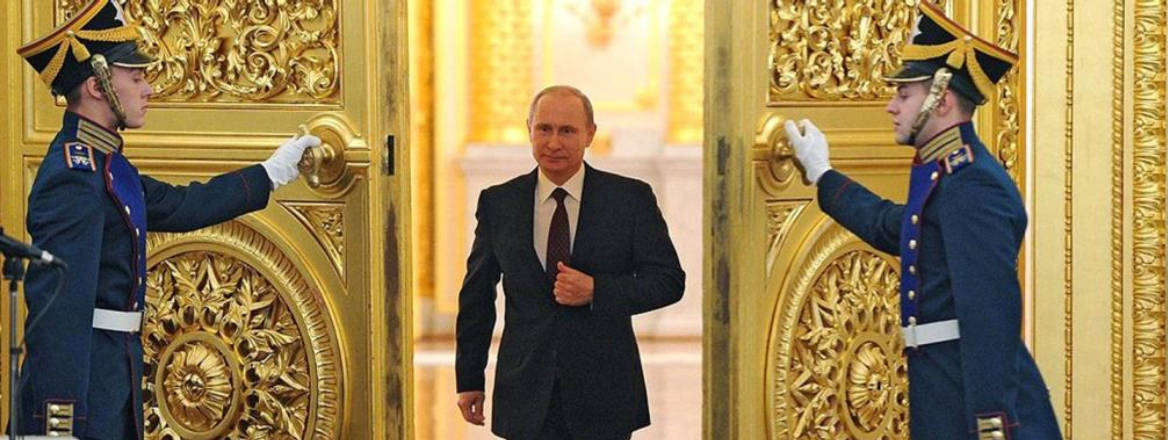The Vlad and Donald Show: Russia–US Relations Get Personal
US President-elect Donald Trump’s nomination of ExxonMobile Chief Executive Rex Tillerson as Secretary of State is being interpreted in Russia as a friendly move. It comes after Russian President Vladimir Putin mentioned US–Russia relations in the most positive light since the Ukraine war began in 2014.
Vladimir Putin’s annual address to the Federal Assembly – the two chambers of the country’s parliament – was this year slightly more positive in tone than last year’s. While the Russian leader devoted much of last year’s speech to countering terrorism and criticising Turkey for failing to do so, this year he sounded more upbeat. And his country has a more upbeat prospect as well: the IMF predicts that the Russian economy will begin to recover in 2017, after a contraction of 3.7% in 2015.
In this year’s speech, Putin made a few short but significant references to improving Russia–US relations in light of the election of Donald Trump. Putin hinted at a rapprochement, saying that ‘Russia is … ready to work with the new US administration.
Putin pointedly reminded Trump’s government to respect Russia as an equal, claiming that ‘we have a shared responsibility to ensure international security and stability’.
He also alluded to what he perceived to have gone wrong in relations with the Obama administration, saying ‘I certainly count on joining efforts with the United States in the fight against real rather than fictional threats, international terrorism being one of them’.
There is optimism in Russia about Trump’s election, but Moscow will no doubt still tread carefully. The US believes it was very much in the Kremlin’s interest to undermine Hillary Clinton’s presidential campaign. The hack of Democratic National Committee emails assisted in de-legitimising Clinton’s position, questioning the purity of Western ‘democratic’ values that underlie US foreign policy.
Sputnik, the government-funded Russian news agency, prominently publicised the hacked documents subsequently released by WikiLeaks, and even altered some of them to create a bogus story that blamed Clinton’s associates for the murderous attack on the US diplomatic installations in Benghazi, Libya, in 2012.
That is not to say that Russia’s definite aim was to help get Trump elected; even if Clinton had subsequently won, the hack would have been valuable for Putin as part of his campaign which alleges that the integrity of liberal democracies is a sham, and that the more authoritarian Russian way of doing things is as equal and as valid to the values which the West claims to uphold.
Moreover, Trump’s election requires more strategic thinking in Moscow, if only in terms of Russian domestic messaging. Putin’s friendlier tone towards the US has signalled to the Russian population that some form of a new ‘reset’ with Washington could be possible.
However, if this is indeed fulfilled in any form, Russia will need new outside powers to scapegoat internal problems. So, the conciliatory message to the Americans is kept lukewarm, just enough to signify a change, but not too much so as to lower the Russians’ guard against the West.
Trump, however, is less predictable than Clinton would have been. This opens up potential opportunities, but it could also lead to a more volatile relationship if subsequent developments do not suit both Trump and Putin.
Putin will no doubt be glad to see ExxonMobil boss Rex Tillerson nominated as Secretary of State, given that the Russian leader awarded him with Russia’s Order of Friendship in 2013. Although Tillerson will have to be approved by the Senate, if elected this will no doubt have an impact on US policy debate on sanctions, which have particularly affected ExxonMobil’s Arctic project.
But that is not to say Trump is bringing in a wholly pro-Russian or ‘pro-business in Russia’ cabinet, for the president-elect’s choice as Defence Secretary, James Mattis, has named Russia as one of the most dangerous world threats, and even hinted at the possibility that Putin is ‘delusional’.
Therefore, despite comments that Putin will no doubt like, such as Trump’s respect for him as a leader, or hints at changes in the US’s commitment to NATO, the trajectory of Trump’s Russia policy remains unclear.
In his address, Putin defined the framework within which relations much be restored, saying they must ‘develop them on an equal and mutually beneficial basis’. Up to now, this has been unrealistic, as there is little that could be seen as ‘mutually beneficial’ for the West in such transactions, given that Russia’s main aim was to ensure any compromise was on its terms.
With Trump this could change, if only because the president-elect is much more flexible on the ‘values’ narrative that has dominated US foreign policy. He also appears comfortable with mixing business and politics, which is a key part of the Russian state structure.
Trump has also frequently promoted conspiracy theories, particularly if they suit his position, which is something Russian media and government officials are familiar with.
The removal of any ‘values obstacle’ increases the chances that Trump and Putin can agree on some areas, but also increases the likelihood that they would act on impulse or personal considerations, and therefore miscalculate.
However, Putin seems comfortable with this prospect: commenting on the subject of personalities in his latest address, the Russian leader claimed that ‘when people feel they are doing the right thing, they act in close solidarity, and advance with confidence along the chosen path’.
Trump and Putin are emboldened by confidence, and often confidence alone. The question is whether this confidence in bilateral dealings will help or hinder cooperation.

